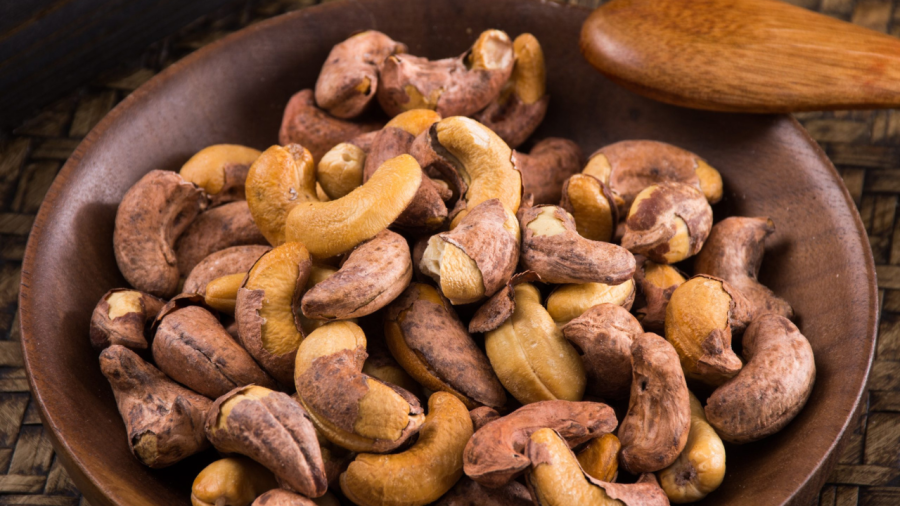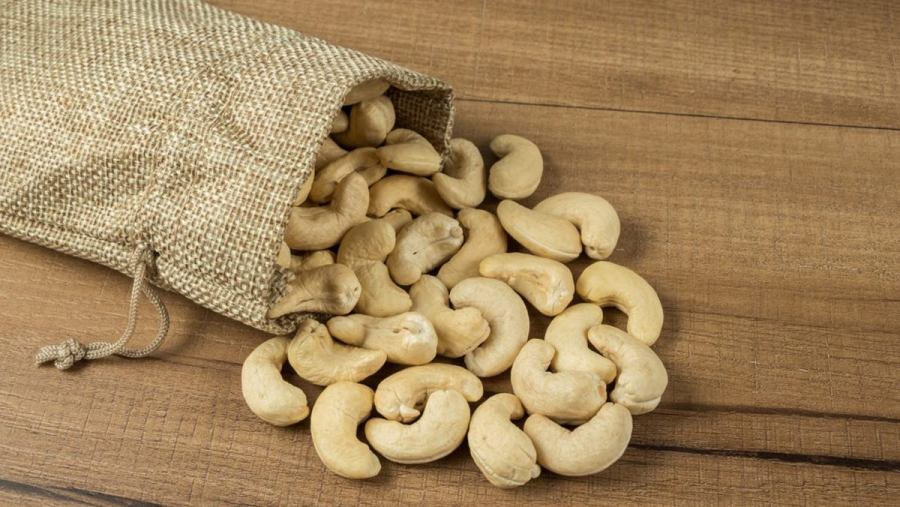Nutritional Composition of Cashews
Cashews contain a wide range of vitamins and minerals, as well as antioxidant compounds such as vitamin E, K, B6, and minerals like copper, phosphorus, zinc, magnesium, iron, and selenium, which all contribute to maintaining optimal body functioning. Specifically, according to the National Nutrient Database from the U.S. Department of Agriculture, 1 ounce of cashews (approximately 28.35g) provides:
157 calories
8.56g carbohydrates
1.68g sugar
0.9g fiber
5.17g protein
Additionally, consuming a portion of cashews (around 18 whole nuts) will offer the following daily recommended nutrients:
31% copper
23% manganese
20% magnesium
17% phosphorus
10% iron
8% selenium
5% vitamins

Benefits of Cashews
With the above-mentioned nutritional components, consuming cashews provides numerous health benefits, including:
Preventing heart diseases: Cashews offer healthy fats that help the body absorb fat-soluble vitamins such as Vitamin A, Vitamin D, Vitamin E, and Vitamin K. They also produce important fatty acids for brain development. The types of fats in cashews are monounsaturated and polyunsaturated fats, which are beneficial for the heart and help reduce bad cholesterol when consumed in moderate amounts.
Good for the eyes: Cashews are rich in lutein and zeaxanthin, antioxidant compounds that protect the eyes from mild damage, especially for older individuals, and may even reduce the risk of cataracts.
Enhancing muscle and nervous system health: Cashews are rich in magnesium, an essential mineral for bone and joint development, blood pressure regulation, immune system support, and maintaining strong, healthy bones. For women post-menopause, cashews can provide better sleep quality and comfort.
Promoting red blood cell production: With the high copper content in cashews, they support the iron exchange process for red blood cell production, which contributes to bone and immune system health and strength.
Boosting oral health: The phosphorus content in cashews is essential for healthy dental and bone development, as well as protein synthesis, carbohydrate and fat metabolism, and maintaining cell health.
Preventing gallstones: Cashews can help reduce cholesterol accumulation in the gallbladder, preventing the formation of gallstones.
Strengthening the immune system: Cashews contain zinc, which plays a vital role in enhancing the immune system, fighting infections, protein synthesis, and wound healing. This is especially important for pregnant women as zinc helps maintain a healthy body for both the fetus and the child’s early years.
Who Should Avoid Eating Cashews?
Children without teeth should avoid consuming roasted cashews
For very young children who do not have teeth, they cannot chew and tend to suck or swallow, which can lead to choking or respiratory distress. Roasted cashews are usually very crispy and cannot soften like cakes or dissolve like candy, so it is not recommended for children who do not know how to chew. If you want to ensure safety, you can grind cashews to make cakes or milk, or cook them until they are soft before allowing the child to eat. For young children, it is advisable for parents to sit beside them while they eat anything.

Pregnant women in their first three months should avoid eating roasted cashews
Consuming cashew nuts is the most effective and maximizes nutrition if pregnant women eat them at the right time. In the first three months of pregnancy, it is a period when the body of the pregnant woman is very weak and unable to absorb nutrients. Therefore, during this time, it is not recommended to consume any nutritious foods such as roasted cashews. In case of craving for roasted cashews, it depends on each person’s constitution, so you can still eat them, but the quantity should be limited, not too much. Eating cashews also carries a risk of allergies, like other nuts, if family members have a history of allergies or sensitivities to nuts.
Individuals with kidney problems should stay away from roasted cashews
With a rich potassium content in cashew nuts, especially salted, it can worsen the condition of kidney failure. At this stage, the kidneys are already weak and unable to function well in choosing cashew nut consumption. Diet plays a vital role in treating and recovering from kidney diseases. For people with kidney disease, this is even more important because their kidneys are severely weakened, and choosing the right foods will help relieve the burden on the kidneys. On the contrary, if you do not understand about this disease and consume inappropriate food, it will worsen your condition. Cashew nuts, which are high in potassium, will worsen the disease. Therefore, people with kidney problems should avoid this food. If you want to consume cashew nuts, you should consult a doctor.
People with hoarseness should limit consumption of roasted cashews
Hoarseness is a phenomenon where the voice changes in pitch and tone, especially in high-pitched sounds, making the voice become hoarse. When you have a sore throat or hoarseness, you should not eat nuts like roasted cashews, peanuts, or almonds because the fatty acids in nuts will irritate the mucous membranes and make your voice even more hoarse. It hinders pronunciation, as the pitch and tone become hoarser and speaking becomes increasingly uncomfortable for the throat.






































